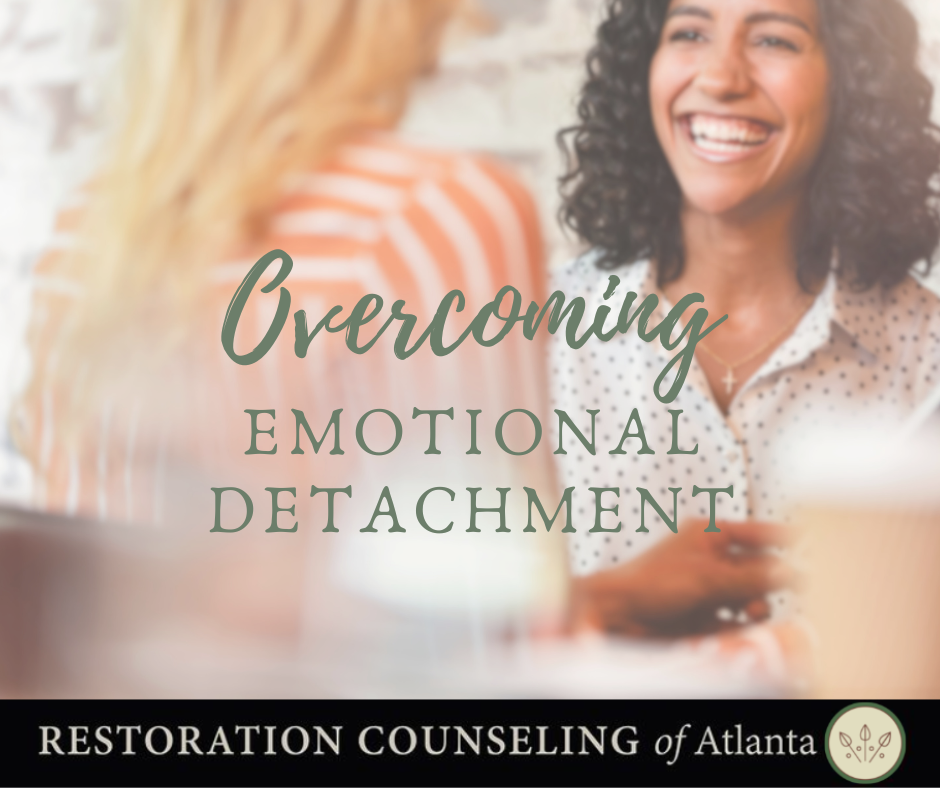What is Emotional Detachment?
Emotional Detachment is a state of being unable to fully experience and engage with one’s own and/or another’s emotions.
Identifying Emotional Detachment
People who struggle with emotional detachment can appear stoic, cold, or unemotional, even in situations that warrant an emotionally charged response. These individuals have difficulty naming, identifying, and experiencing emotions. They may display a flat mood and find it challenging to have compassion for themselves or others. Also, they may experience a disconnect between their body’s manifestation and their mind’s awareness of these emotions. This lack of appropriate emotional experience may or may not distress the individual at a given moment.
For example, I once worked with impoverished children in Phoenix, AZ. A group of boys were playing basketball when suddenly, the ball forcefully struck a young girl straight in her face. To my amazement, she sat there staring, with no response or affect (emotional expression). I knew the ball must have hurt her, yet she did not reach out for comfort, or respond to her pain with crying or anger.
Is Emotional Detachment a Problem?
Is it good that the girl did not cry when struck by the ball?
God created each of us with physical bodies that house our emotions, mind, and spirit. To be whole and fully mature, each part (body, emotion, mind, and spirit) must grow individually and together. If these parts work out of sync, we cease being able to grow. We cease being able to protect ourselves and others. Human health and wholeness must have the participation of body, mind, emotion, and spirit.
So, what would prevent the girl from being hit again by the ball? What would this result in? The girl’s behavior (freezing and denying the reality of harm) was not a protective strategy that would work long-term.
How Does Emotional Detachment Develop?
- Emotional detachment is often a learned behavior. Early experiences with caregivers can shape our emotional responses in ways that are lasting and difficult to alter. Our families are often the first place and the most influential environment where we learn what emotions are and what to do with them. Growing up, you may have heard a strong discouragement of emotional expression such as, “I’ll give you something to cry about.” Many rules regarding emotion are unstated in families, yet they shame emotional expression. Society norms also dictate what is acceptable as a display of emotional expression. When considering cultures worldwide, we see significant variations in grief expression, public displays of affection, anger, and even joy.
- Emotional detachment can be adaptive when first responding to an emergency or crisis. Often in these situations, our bodies leap into action while our emotions are put on “hold.” We focus on necessary tasks and delay emotional engagement. However, failing to engage the related emotions does not remain adaptive when the crisis has ended. At times, it can be difficult to re-engage with emotions.
- Emotional detachment can result from biological/physiological reasons such as illness, hormonal changes, substance abuse, physical trauma, or medications (such as Prozac or Paxil). Changes that happen to our bodies directly impact our emotions. With more scientific evidence, this connection has only strengthened in recent years.
- Emotional detachment can be a manifestation of a neurobiological state which results in inescapable trauma or stress. When individuals (especially children) experience neglect or abuse of various kinds, this can create a need to disconnect from the associated negative emotions. When the trauma elicits that negative emotion (fear or anger), the child has a choice. Do I stop the trauma, or stop the accompanying emotion? Often, they cannot stop the trauma from occurring, and their only way to escape it and have some control is to “dump” or “stuff” their emotions. They have learned it is no use to cry or find an adult for a comforting hug after being physically hurt, like the girl in the above example. The traumas she likely faced taught her that detaching emotionally was the only way to find relief. Though this brought some relief at the moment, it will cripple her ability to experience life fully in the future. In extreme cases, this resulting emotional detachment is associated with mental disorders such as Post Traumatic Stress Disorder (PTSD), Depression, Personality Disorders, and Dissociative Disorders.
- Emotional detachment can also be a symptom of a mental illness that does not appear to be trauma-related.
What to Do About Emotional Detachment?
- As believers, we can appeal to our God to heal us and make us whole persons, able to connect body, mind, and spirit. He knows all our wounds and teaches us to know ourselves and become good stewards of ourselves.
- Take an emotional history of yourself that highlights your most intense emotional experiences. How old were you, what was the identified feeling, and how did you and others receive those feelings? What did you learn to do with those feelings from those around you? You can use old photos or old journals to spark your memory.
- Use journaling to record your emotions in the here and now. Use an “emotion wheel” if you need to. This can help give you the words to express the nuance of each feeling.
- Use exercise to connect to your own body. You are in the prime position to know how your body is experiencing emotion. Body awareness is an important part of recognizing when an emotion is trying to communicate to you. Listen to your body. Use Christian-friendly yoga or dance, or even a step-by-step mental body scan to check for tension.
- Practice talking about your emotions with those you trust around you. Sharing our emotional experiences is very helpful in processing and making meaning of them. Our bodies naturally have an impressionable memory of any highly emotional experience. Trust your body to remind you.
What if I’m Stuck in Emotional Detachment?
If you have often felt stuck or numb to your emotions, please seek help from one of our therapists at Restoration Counseling Atlanta. Each of them is equipped to help you out of this stuck period and into a hopeful state of growth and wholeness.
Do you feel helpless to handle your emotions and tempted toward harmful behavior? Again, that is a sign that it is time to get support. If you are “stuck,” you have likely been burdened for far too long. It is time to discover your whole self and who God is calling you to be. Do yourself the honor of beginning this journey of discovery.

Written by: Nancy Messner
nancy@restorationcounselingatl.com
678-534-3824, ext.130
Nancy has a passion for working with individuals and families as they strive to face life’s challenges. She is a pastor’s wife of 27 years and they have five children together (ages 11-22). She offers an objective, understanding, and non-judgmental atmosphere where individuals and families can work on healing and growing under the light of God’s truth. Nancy received her training from Wheaton College in 1999 and has lived in Atlanta for 10 years.

